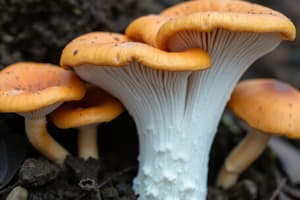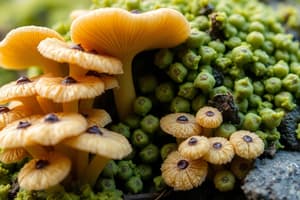Podcast
Questions and Answers
What is a primary function of mushrooms and other fruiting bodies in the fungal life cycle?
What is a primary function of mushrooms and other fruiting bodies in the fungal life cycle?
- Photosynthesis
- Reproduction (correct)
- Respiration
- Nutrient storage
Which industry significantly benefits from the use of fungi?
Which industry significantly benefits from the use of fungi?
- Construction
- Agriculture (correct)
- Aerospace
- Automotive
Which fungus-derived compound is used as an immunosuppressant?
Which fungus-derived compound is used as an immunosuppressant?
- Penicillin
- Cyclosporine (correct)
- Insulin
- Aspirin
What is a primary mode of reproduction in yeasts?
What is a primary mode of reproduction in yeasts?
Which environmental factor does NOT directly influence the timing of fungal reproductive structures?
Which environmental factor does NOT directly influence the timing of fungal reproductive structures?
What role do fungi play in supporting ecosystem health?
What role do fungi play in supporting ecosystem health?
Which of the following statements accurately describes the ecological role of fungi?
Which of the following statements accurately describes the ecological role of fungi?
Which of the following is NOT a common type of fungi mentioned in the text?
Which of the following is NOT a common type of fungi mentioned in the text?
What is the primary role of yeasts in the context of fungi?
What is the primary role of yeasts in the context of fungi?
Which of the following statements about fungi is NOT true?
Which of the following statements about fungi is NOT true?
What is the term used to describe the symbiotic relationship between fungi and plant roots?
What is the term used to describe the symbiotic relationship between fungi and plant roots?
Which of the following statements is true about the diversity of fungi?
Which of the following statements is true about the diversity of fungi?
Flashcards are hidden until you start studying
Study Notes
Introduction
Fungi are a diverse group of eukaryotic organisms that perform vital roles in ecosystems, human life, and industry. While they are often associated with decay, decomposition, and disease, fungi contribute significantly to our daily lives through their ecological, medicinal, agricultural, and commercial value. This article explores the different aspects of fungi, including their ecology, types, economic importance, medical significance, and reproduction.
Fungi Ecology
Fungi play crucial roles in various ecosystems, influencing biogeochemical cycles, nutrient cycling, and the establishment of plant communities. They form symbiotic relationships with plants, commonly referred to as mycorrhizas, in which fungi colonize the plant roots and facilitate nutrient uptake. Additionally, fungi contribute to soil health and carbon sequestration by promoting soil fertility, enhancing plant growth, and participating in the decomposition of organic matter.
Types of Fungi
Fungi encompass a wide range of life forms, from single-celled organisms to complex multicellular structures with extensive underground systems extending for miles. Some common types include yeasts, mushrooms, and mold fungi. Yeasts are unicellular fungi that play essential roles in fermentation processes, such as baking, brewing, and winemaking. Mushrooms and other fruiting bodies serve multiple purposes, including reproduction, habitat creation for arthropods, and food sources for various animals, including humans.
Economic Importance of Fungi
Fungi have significant economic importance across various industries. In medicine, fungi produce antibiotics and are used in the production of valuable drugs like cyclosporine, which is an immunosuppressant. Agriculturally, mycorrhizal associations between fungi and plants enhance soil fertility and plant growth, making them crucial for the productivity of farmland. Additionally, fungi are a food source for many species, as well as being consumed by humans as delicacies such as morels, shiitake mushrooms, chanterelles, and truffles.
Medical Importance of Fungi
Fungi's role in human health extends beyond their medical applications. They provide essential nutrients through their interactions with other organisms, particularly plants, contributing to overall ecosystem health and sustenance. Some fungi also serve as biological insecticides, controlling pests that can damage crops or pose threats to public health. Furthermore, fungi are valuable research tools in fields such as genetics, providing insights into complex biological processes.
Fungi Reproduction
Fungi reproduce primarily through spore formation, with different types of fruiting bodies appearing depending on the specific fungus. For example, mushrooms and truffles emerge from basidiomycetes fungi, while yeasts typically reproduce via budding or fission. The timing of reproductive structures depends on environmental conditions such as temperature, light, pH, and moisture levels, reflecting the unique adaptations of each species.
Conclusion
Fungi are indeed vital microorganisms that carry out crucial functions, often unseen but essential to our daily lives. From supporting ecological processes to contributing to human well-being through medicine, agriculture, food, and research, fungi demonstrate the marvelous complexity and interconnectedness of life on Earth. Understanding these fascinating organisms better can help us appreciate their myriad roles and develop strategies to protect them and maximize their benefits.
Studying That Suits You
Use AI to generate personalized quizzes and flashcards to suit your learning preferences.




